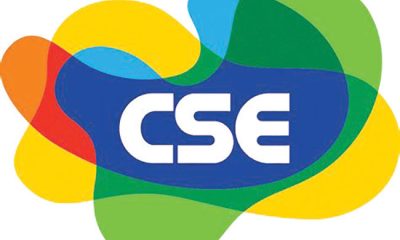Business
WB report on poverty seen as dampening bourse

By Hiran H. Senewiratne
CSE trading was sluggish throughout yesterday and the lowest turnover level for the year was recorded. Both indices moved downwards, market analysts said.
Investors are still adopting a- wait- and -see approach due to certain reports by the World Bank revealing that Sri Lanka’s poverty level would increase by 25 per cent this year.
Further, corporate results released by 25 companies up to now show performances that are below expectations. Besides investors are seeking further clarity on debt restructuring and optimization, analysts said.
Amid those developments both indices moved downwards. The All- Share Price Index went down by 13 points and S and P SL20 declined by 16.8 points. Turnover stood at Rs 415 million without any crossings.
In the retail market top seven companies that mainly contributed to the turnover were, Lanka IOC Rs 170 million (1.1 million shares traded), Browns Investments Rs 21.5 million (3.96 million shares traded), Dialog Axiata Rs 13.2 million (1.2 million shares traded), Sampath Bank Rs 11.5 million (224,000 shares traded), HNB Rs 10.3 million (88,000 shares traded), Royal Ceramic Rs 10 million (371,000 shares traded) and Hayleys Rs 8.1 million (120,000 shares traded).
It is said high net worth and institutional investor participation was noted in Expolanka Holdings and Sampath Bank. Mixed interest was observed in HNB and National Development Bank, while retail interest was noted in Browns Investments, Tokyo Cement Company and Aitken Spence Hotel Holdings.
The banking sector was the top contributor to the market turnover (due to Sampath Bank, National Development Bank and Hatton National Bank), while the sector index gained 0.36%. The share price of Sampath Bank gained 70 cents to reach Rs. 51.40. The share price of National Development Bank moved up by 10 cents to reach Rs. 43.20. The share price of Hatton National Bank recorded a loss of Rs. 2.75 to dip to Rs. 115.
The Transportation sector was the second highest contributor to the market turnover (due to Expolanka Holdings) while the sector index increased by 1.76 per cent. The share price of Expolanka Holdings increased by Rs. 2.75 to Rs. 158.75.
Yesterday, bond yields were slightly up during mid-day trade as results of a bill auction were awaited, while the rupee was trading at 317.30/50 against the US dollar in the spot market, dealers said.
A bond maturing on 01.09.2027 was quoted at 28.40/60 per cent, slightly up from 28.30/50 per cent at yesterday’s close.
A bond maturing on 15.05.2026 was quoted at 30.00/50 per cent on Wednesday, steady from 30.00/25 per cent at last close.
Business
CMTA calls for urgent recall of vehicle valuation and import processes

The Ceylon Motor Traders Association (CMTA) has highlighted the fact that Sri Lanka’s vehicle import framework requires urgent recalibration to ensure fairness, transparency, and the protection of state revenue. The CMTA states that one of the most critical issues that must be addressed is the automatic 15 per cent reduction applied to the CIF value of used vehicle imports when calculating import duties. The CMTA maintains that duty calculations should be applied uniformly across all importers, whether the vehicle is brought in through an authorised agent as brand new or through a dealer as a used import.
For example, if an authorised agent imports a 2026 zero-mileage vehicle of a particular brand at a CIF value of USD 50,000, the full value is used for duty assessment. However, if a dealer imports the exact same 2026 model, also zero mileage and identical in specification, but registered and subsequently de-registered prior to shipment, the CIF value for duty purposes is reduced by 15% to USD 42,500. This concession is granted solely because the vehicle is technically classified as “used” due to prior registration, despite there being no practical difference in mileage, condition, or specification between the two vehicles.
The CMTA believes this practice creates a structural imbalance in the market and results in a significant erosion of import duty revenue to the State. When two identical zero-mileage vehicles are assessed at different CIF values purely on the basis of a procedural registration classification, it distorts competition, disadvantages compliant authorised agents, and undermines equitable tax collection. The Association therefore calls for a uniform valuation approach that reflects the true transacted value of the vehicle, regardless of its registration status prior to export.
Compounding this issue is the widespread application of a 15% depreciation adjustment, which further distorts declared values. When combined with under-declared transaction prices and manipulated valuations, duty is calculated on figures that are significantly lower than actual market value. These reduced values are then reflected across various online platforms and price-tracking websites, creating a distorted reference market that reinforces undervaluation and normalises non-compliant pricing behaviour.
One of the most pressing issues confronting the State is the growing misuse of VAT-free trade-ins which certain car sales are supposed to be practicing within the used vehicle business. These transactions, often structured as vehicle-for-vehicle or vehicle-for-asset exchanges in selling an unregistered vehicle and bypass standard VAT mechanisms and obscure the true transacted value of imports. Such practices often allow vehicles to enter the market with lower invoice values, directly impacting the calculation of import duties and other applicable taxes.
The absence of structured, enforceable processes to accurately define and verify transacted value has created an environment where valuation practices vary widely and lack accountability. Evaluations are frequently conducted at lower price points that do not reflect genuine purchase consideration, enabling systemic revenue leakage for the Government. While mechanisms exist in principle to address these discrepancies, their inconsistent application has rendered them ineffective.
Vehicle imports through CMTA members which operate within clearly defined and auditable frameworks, demonstrate that transparent valuation and predictable tax collection are both achievable and sustainable. These channels provide the State with accurate invoicing, traceable foreign currency outflows, and reliable duty and VAT collection, while limiting the scope for malpractices.
The CMTA believes that consumer safety cannot exist in isolation. The association believes that authorities have a responsibility to ensure that all businesses within the automotive industry operate ethically and within the law. When certain segments of the market are permitted to circumvent regulation, consumer safety is compromised and businesses committed to lawful operations and sustained customer support are placed at an unfair disadvantage.
Therefore, the association urges the relevant authorities to rigorously enforce existing laws and regulations to mitigate malpractices and ensure a level playing field for all participants in the industry and ensure proper collection of tax revenue for the nation. Fair enforcement will not restrict consumer choice; it will enhance it by promoting transparency, safety, and accountability across the market.(CMTA).
Business
Understanding Fixed Income

This article is part of a collaborative series by the CFA Society Sri Lanka, Securities and Exchange Commission of Sri Lanka (SEC) and the Colombo Stock Exchange (CSE) which aims to enhance financial literacy and empower individuals with the knowledge and tools to make informed financial decisions and build long-term financial security. This week, we present the third article from our series: Understanding Fixed Income, authored by Keshawa Perera, CFA.
Fixed income investments, commonly known as bonds, provide regular interest payments and return your original investment at the end of a fixed term. When you buy a bond, you’re lending money to a government or company, and in return, you receive fixed interest payments (the “coupon”) and your principal at maturity. Bonds are valued for their stability and predictable income, making them a foundation for conservative investors and retirees seeking steady yet lower-risk returns.
How Bonds Work:
The Basics
A bond is a legal agreement between a borrower (issuer) and a lender (investor). The issuer promises to pay back the principal (face value) and make regular interest payments at a set rate (coupon rate) on specified dates (coupon dates) until the maturity date. Bonds are categorized by their maturity:
Short-term:
Up to 3 years
Medium-term:
3–10 years
Long-term:
Over 10 years
While bonds pay fixed interest, their value can fluctuate in the secondary market, where bonds are bought and sold after being issued. In the secondary bond market, bond prices and interest rates move in opposite directions. When interest rates fall, existing bonds with higher fixed interest rates become more attractive to investors, so their prices go up. Conversely, when market interest rates rise, older bonds offering lower interest rates become less valuable, causing their prices to drop. If you sell a bond before maturity, you may receive more or less than you paid, depending on market interest rates. Accrued interest (the interest earned since the last payment), is added to the bond’s sale price.
What determines the interest rates on bonds
Central bank policy rates and expectations: Short-term market rates are guided by Central Bank policy rtaes, which act as the benchmark for market interest rates. In addition, expectations about future policy decisions (such as rate hikes or cuts) can significantly influence how market interest rates move.
The Issuer: Bonds are issued by both the government ( such as Treasury bills and bonds) and private companies (known as debentures). The higher the risk that an issuer may not meet its interest payments, the higher the interest rate offered. Credit ratings are independent assessments issued by rating agencies such as Moody’s, S&P and Fitch Ratings, that measure how likely a government or company is to repay its debts. They help investors understand default risk, ranging from safer “investment grade” to riskier “speculative” grades. However, credit ratings are only opinions,not guarantees,so they should be considered together with your own analysis.
Term to Maturity: Longer maturities carry more uncertainty and so investors demand a higher interest rate (known as a term premium) to compensate for this risk
Liquidity: If a bond is not traded often, it can be harder to sell quickly. To make up for this, such bonds usually pay a higher interest rate, called a liquidity premium.
How Investors Earn Returns
from Bonds
1. Interest Income (Coupon Payments):
Most bonds pay regular interest, typically every six months.
Example:
If you invest LKR 100,000 in a Treasury Bond with a 12% coupon, you receive LKR 6,000 every six months until maturity.
2. Discounted Instruments (Treasury Bills):
Treasury Bills (short-term securities issued by governments) don’t pay periodic interest. Instead, you buy them at a discount and receive the full-face value at maturity.
Example:
Buy a 364-day T-Bill for LKR 92,000 (discounted price); at maturity, you receive LKR 100,000 (face-value), your return is LKR 8,000. The interest rate is 8.7%.
3. Capital Gains or Losses:
If you sell a bond before maturity, you may make a profit (capital gain) or loss, depending on market interest rates.
Example:
If you buy a corporate debenture at LKR 100,000 with a 10% coupon and sell it for LKR 105,000 after rates fall, you gain LKR 5,000 plus interest received.
Bonds vs. Stocks:
Understanding Risk and Stability
Shares and bonds serve different roles. Shares offer ownership in a company and the potential for high returns, but with greater volatility and risk. Bonds are loans to companies or governments, providing stable, predictable income and lower risk.
Predictable Income:
Bonds pay fixed interest, unlike shares, where dividends are not guaranteed.
Priority in Liquidation:
Bondholders are settled before shareholders if a company fails and is liquidated.
Defined Maturity:
Bonds have a set end date for repayment; shares do not.
Sri Lankan Experience:
From 1994–2024, the ASPI index averaged 14.57% annual nominal returns with 37.10% volatility. Treasury bills in comparison averaged 11.34% returns with no principal losses. Bonds provided stability while shares offered higher long-term returns but with greater risk.
Risks of Bond Investing
Bonds are generally less risky than shares, but not risk-free. Key risks include:
Interest Rate Risk:
When interest rates rise, bond prices fall. This is more pronounced for longer-term bonds.
Credit (Default) Risk:
The risk that the issuer fails to pay interest or principal. Typically this risk is higher with Corporate bonds or high-yield junk bonds with weak credit ratings. Government bonds usually are safer with lower credit risk, but Sri Lanka’s 2022 sovereign default shows that even these can be affected by economic crises. (Note: investors holding Sri Lankan government rupee bonds were not directly affected by the 2022 default, which mainly impacted external debt or foreign currency bonds. However local government bond holders experienced indirect impacts through high inflation and sharp interest-rate movements and policy uncertainty.)
Inflation Risk:
Rising inflation reduces the real value of fixed interest payments, thereby decreasing the ability to buy goods and services over time.
Liquidity Risk:
Some bonds, especially corporate debentures, may be hard to sell quickly in the secondary market, without a price discount.
Role of Credit Ratings
The Sri Lankan Bond Market:
An Overview
Government Securities:
Issued by the Central Bank of Sri Lanka (CBSL), these are considered highly reliable and are available in “scripless” (electronic) form.
Investors can buy new issues through licensed intermediaries called Primary Dealers or licensed commercial banks (minimum LKR 5 million in the primary market) or in smaller amounts in the secondary market. All transactions are electronic and managed by the LankaSecure System, providing security and liquidity.
Corporate Debentures:
Companies issue debentures to raise funds, usually listed on the Colombo Stock Exchange (CSE).
Maturity:
Typically, around five years
Interest: Fixed or floating rates (e.g., 12.5% per annum or linked to T-Bill rates)
Payment Frequency:
Annually, biannually, or quarterly
Security:
Often unsecured, with varying priority in liquidation
Purpose: To strengthen capital or business expansion
Sustainable Bonds (GSS+):
Recent regulatory changes allow Green (money is borrowed for environmentally friendly projects), Blue (focused on marine and freshwater conservation projects), Social, and Sustainability-Linked Bonds. These raise funds for environmental or social projects and attract investors focused on ESG (Environmental, Social, Governance) criteria.
Bonds in Your Portfolio:
Why They Matter
Bonds are a key part of a diversified investment strategy. They provide:
Stability:
Lower volatility than shares, especially during market downturns.
Predictable Income:
Regular interest payments, useful for budgeting and retirement.
Risk Reduction:
Help offset potential losses from riskier assets like shares.
Portfolio Balance:
The right mix of bonds and shares depends on your age, risk tolerance, and financial goals. Younger investors may hold fewer bonds, while those nearing retirement may increase bond allocations for stability and income.
Conclusion:
The Role of Bonds for Sri Lankan Investors
Bonds offer a reliable way to grow and protect your savings, providing stable income and reducing overall investment risk. While generally safer than shares, they are not entirely risk-free,interest rates, inflation, and credit events can affect returns. The Sri Lankan market offers a range of government and corporate bonds, including innovative sustainable options. By understanding how bonds work and the risks involved, investors can use fixed income securities to build a more resilient and balanced portfolio.
Business
American Premium Water redefines hydration with industry-first loyalty programme and mobile application

American Premium Water, an industry pioneer and market leader with over 30 years of experience in trusted and sustainable hydration, celebrated the launch of its Loyalty Programme and mobile application. The launch, held on 16th February 2026 at Cinnamon Lakeside, Colombo, marked a significant milestone as the first of its kind within Sri Lanka’s bottled water industry, reaffirming the company’s consistent commitment to product and service excellence.
Designed to promote healthier lifestyles, the American Premium Water Loyalty Programme rewards customers while encouraging regular hydration to support overall wellness. The programme features a quarterly reward scheme for Corporates, Small and Medium enterprises (SMEs), and Households, recognising and motivating commitment to healthier routines.
Launched alongside the Loyalty Programme, American Premium Water’s mobile application offers a convenient way for customers to track their daily hydration, monitor consumption patterns, receive real-time delivery updates, and manage payments efficiently. To further support healthy routines, customers who download and use the app for more than two months are eligible to have their monthly bill waived.
-

 Life style7 days ago
Life style7 days agoMarriot new GM Suranga
-

 Business6 days ago
Business6 days agoMinistry of Brands to launch Sri Lanka’s first off-price retail destination
-

 Features7 days ago
Features7 days agoMonks’ march, in America and Sri Lanka
-

 Features7 days ago
Features7 days agoThe Rise of Takaichi
-

 Features7 days ago
Features7 days agoWetlands of Sri Lanka:
-

 News7 days ago
News7 days agoThailand to recruit 10,000 Lankans under new labour pact
-

 Latest News1 day ago
Latest News1 day agoECB push back at Pakistan ‘shadow-ban’ reports ahead of Hundred auction
-

 News7 days ago
News7 days agoMassive Sangha confab to address alleged injustices against monks























